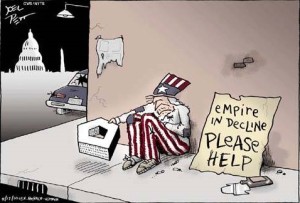By: Luke Gould
As Dutch and Australian investigators comb over the wreckage of Malaysia Air flight 17, downed last week by pro-Russian separatists in eastern Ukraine, and as the Islamic State in Iraq and the Levant (ISIS) consolidates its Islamic Caliphate in Northern Iraq and Syria, one is left to wonder: What do these and other recent events mean for the future of the West and of American global hegemony?
According to Journalist Charles Kupchan of The Atlantic, “the emerging consensus in foreign-policy circles [is] that American primacy is eroding thanks to the shift in global power from the West to the ‘rising rest.’ China and other nations are steadily ascending … while the United States and its allies are stuck in an economic rut. The long era of Western hegemony seems to be coming to an end.”
As certain regions destabilize, new powerful economies emerge. The West, plagued by economic difficulty and unpopular foreign policy, struggles to maintain control. The face of global geopolitics is shifting and the United States is losing its position as head of the global capitalist system.
During the Cold War, the United States was well on its way to becoming the world’s economic and cultural center. It utilized military power, covert operations, coups d’états, economic superiority, sanctions, the World Bank, the International Monetary Fund and seemingly any other means to oppose the Soviet Union and assert control over the developing world. Using the same Cold War tactics, the United States has, in recent decades, situated itself not only as the sole superpower but as the head of a global economic empire. American culture, political institutions, economic practices, brands, entertainment, and multinational corporations are globalized. However, it seems that that empire and more generally speaking western dominance is beginning to slip away.
Today, the United States’ efforts overseas have turned into a hopeless struggle to maintain waning influence. After more than a decade of war in Iraq, the Middle East has been torn apart by sectarian fighting and religious extremism. As a result, civil war devastates Syria and extremist fundamentalist organizations like ISIS have emerged. American military forces will finish their withdrawal from Afghanistan this year and it is likely that chaos will be left in their wake. What started as two wars intend to expand the sphere of American influence have become two crippling self-inflicted wounds. These wars have delegitimized American foreign intervention, reduced American credibility and damaged the domestic economy.
As the United States recovers from this bout of inept foreign intervention, what economists call the BRICS countries, Brazil, Russia, India, China and South Africa, are emerging with stronger economies and increasingly engaged foreign policies. The hegemony of the West and of the empire of the United States is ending.
China and the rest of Asia are strengthening economic ties with Latin America and Africa. USA Today Journalist Jacob Kushner describes the situation in Africa. “Throughout Angola, Ghana and the Congo, some of China’s largest companies are building roads and railways. They’re backed by Chinese banks, and they’ll pay off their loans in kind through mining and oil deals.” The Chinese are posed to make huge fortunes in Africa. The situation in Latin America is similar. Just one example is the recently approved a plan to build a trade canal through Nicaragua proposed by Hong Kong based company HKND. The purposed canal would support larger ships, growing global trade and provide an alternative for the American built Panama Canal. It would appear that American foreign investment is being outmatched at every corner and other nations are reaping the benefits.
In Europe, recent developments have brought old tensions back to life. In Eastern Ukraine the Russian Federation is fearlessly arming separatist forces, while the United States and its allies desperately act to support the pro-western government in Kiev. The resolve coming from Moscow is an unprecedented turning point in global affairs. Russia is coming out isolation, challenging western superiority and forcing the United States to rethink its position.
This state of affairs is made worse by the situation at home. The American economy and many Western economies have become stagnate. The American military is the most expensive in the world. In a twist of irony, huge defense spending designed to maintain American influence has weakened the economy at home. Universities are overpriced, jobs are few and earning power is weak. The public is tired of financing heavy handed overseas military involvement. Europe faces high unemployment and sluggish economic growth, coupled with a recent rise in popularity of far right nationalist parties.
In short, American efforts to exert control have been punctuated by death, destruction, backfire, economic downturn and outright failure. American foreign investments have been out matched left and right. Instability is rampant. Other players on the world stage are out competing and standing up to the United States.
Much like the British after the Second World War and the Romans before them, America is beginning to decline as the world economic and political power. The more the American military tightens its grip the more the situation slips from their fingers. Despite this, some in the United States continue to believe that the nation must continue the paradoxical road to global superiority by way of foreign interventions and covert operations. Others more optimistically hope that policy can be aimed at developing both a stronger domestic economy and more balanced foreign policy. Ultimately the United States can stand up to nations like China and Russia. By solving its own domestic problems and by promoting stronger international institutions to maintain global stability, protect human rights, protect the sovereignty of nations, and foster development, the United States can pave the way to a more just and equitable global system.
Cartoon Credit of Joel Pett of the Lexington Herald Leader

